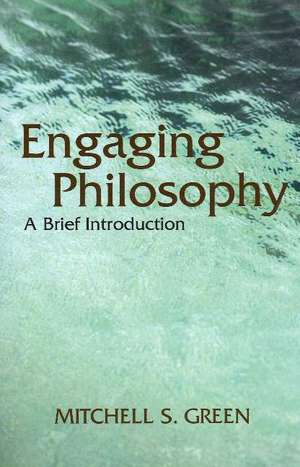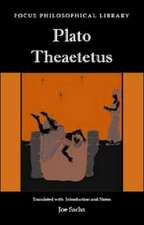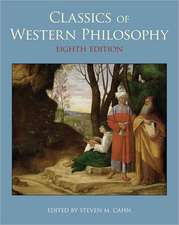Engaging Philosophy: A Brief Introduction
Autor Mitchell S. Greenen Limba Engleză Paperback – 31 mar 2006
| Toate formatele și edițiile | Preț | Express |
|---|---|---|
| Paperback (1) | 106.17 lei 22-36 zile | +18.24 lei 5-11 zile |
| Hackett Publishing Company – 31 mar 2006 | 106.17 lei 22-36 zile | +18.24 lei 5-11 zile |
| Hardback (1) | 230.24 lei 22-36 zile | |
| Hackett Publishing Company – apr 2006 | 230.24 lei 22-36 zile |
Preț: 106.17 lei
Preț vechi: 115.44 lei
-8% Nou
Puncte Express: 159
Preț estimativ în valută:
20.32€ • 22.08$ • 17.08£
20.32€ • 22.08$ • 17.08£
Carte disponibilă
Livrare economică 31 martie-14 aprilie
Livrare express 14-20 martie pentru 28.23 lei
Preluare comenzi: 021 569.72.76
Specificații
ISBN-13: 9780872207967
ISBN-10: 087220796X
Pagini: 176
Ilustrații: illustrations
Dimensiuni: 9 x 215 x 139 mm
Greutate: 0.22 kg
Editura: Hackett Publishing Company
Colecția Hackett Publishing Company, Inc (US)
ISBN-10: 087220796X
Pagini: 176
Ilustrații: illustrations
Dimensiuni: 9 x 215 x 139 mm
Greutate: 0.22 kg
Editura: Hackett Publishing Company
Colecția Hackett Publishing Company, Inc (US)
Recenzii
Provides a wonderful and unique introduction to philosophy--not just to its central questions and the creative answers (some classic and enduring, some cutting-edge) that philosophers have given, but also to the shared techniques, style, and wonderment that makes philosophy so, well, engaging. The book can clearly be used on its own, or along with a selection of the philosophical texts it discusses. Particularly useful in this regard are the study questions and further reading suggestions that come at the end of each chapter. --Joseph G. Moore, Amherst College
This lively introduction does not say that philosophical work is not the rote memorization of dry and dusty doctrines. Far better, it shows it, with wonderfully lucid discussions of good and bad reasoning, 'the Greatest Conceivable Being', moral relativism and objectivism, consciousness and the mind, free will, and personal identity. Students, or any readers wanting a stimulating introduction to the field, will see these issues spring to life under Professor Green's able tutelage, and they will learn by example the intellectual virtues of clarity, rigor, and conceptual discernment. Green shows what it is to be alive to philosophical issues, and he shows why--as he memorably puts it--philosophy never sleeps. A brilliant introduction. --Garry L. Hagberg, James H. Ottaway Professor of Philosophy and Aesthetics, Bard College
Extremely well done. The author has organized his material so that it flows nicely and conveys a sense that philosophical reasoning moves from one point to another, with questions raised, options considered, and so forth. The accounts of the steps along the way are very easy to read, clear as a bell, use traditional texts in a nonthreatening and 'natural' way, and employ nice examples that students will relate to. --Michael Morgan, Indiana University
This lively introduction does not say that philosophical work is not the rote memorization of dry and dusty doctrines. Far better, it shows it, with wonderfully lucid discussions of good and bad reasoning, 'the Greatest Conceivable Being', moral relativism and objectivism, consciousness and the mind, free will, and personal identity. Students, or any readers wanting a stimulating introduction to the field, will see these issues spring to life under Professor Green's able tutelage, and they will learn by example the intellectual virtues of clarity, rigor, and conceptual discernment. Green shows what it is to be alive to philosophical issues, and he shows why--as he memorably puts it--philosophy never sleeps. A brilliant introduction. --Garry L. Hagberg, James H. Ottaway Professor of Philosophy and Aesthetics, Bard College
Extremely well done. The author has organized his material so that it flows nicely and conveys a sense that philosophical reasoning moves from one point to another, with questions raised, options considered, and so forth. The accounts of the steps along the way are very easy to read, clear as a bell, use traditional texts in a nonthreatening and 'natural' way, and employ nice examples that students will relate to. --Michael Morgan, Indiana University

















